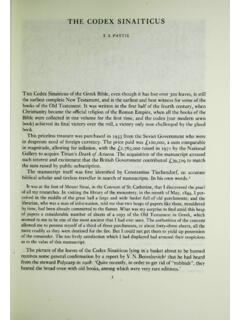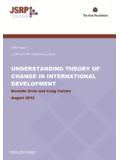Transcription of Management Theories and its Application in …
1 BAM2014 This paper is from the BAM2014 Conference Proceedings About BAM The British Academy of Management (BAM) is the leading authority on the academic field of Management in the UK, supporting and representing the community of scholars and engaging with international peers. TITLE: Management Theories and its Application in Organisations: The nigerian experience LIST OF AUTHORS & AFFILIATIONS: Adeniyi Damilola OLAREWAJU (Corresponding Author) University of Lagos Olusoji James GEORGE University of Lagos CONTACT ADDRESS AND EMAIL: Adeniyi Damilola OLAREWAJU* Department of Business Administration, University of Lagos Lagos State, Nigeria. Olusoji James GEORGE Department of Business Administration, University of Lagos Lagos State, Nigeria. *Doctoral Candidate, Department of Business Administration, University of Lagos, Lagos, Nigeria.
2 Management Theories and its Application in Organisations: The nigerian experience Abstract Title Management Theories and its Application in Organisations: The nigerian experience Abstract / Summary The development, transferability and practice of western Management Theories in Africa, nay Nigeria, have dominated literature on Management in Nigeria. This study provides a descriptive examination and traces the historical development of each Management school of thought, as well as its significance on Management practice and limitations. Despite the fact that this study examined emerging thoughts in contemporary Management practice, a significant gap was identified as dearth of literature on the practice of these Management approaches in nigerian organisations. To bridge this gap, this study analysed the major components of each Management theory and presented models of nigerian organisations built on same principles or approaches.
3 Relying on historical and narrative analysis, the findings established evidence of the practice of western Management Theories in nigerian organisations. The study concluded that Management practice in Nigeria can be enhanced, if peculiar socio-cultural factors are given adequate consideration in the Application of Management approaches. (150 Words) Word Count 6,231 Words (excluding tables and references) Management Theories and its Application in Organisations: The nigerian experience Abstract The development, transferability and practice of western Management Theories in Africa, nay Nigeria, have dominated literature on Management in Nigeria. This study provides a descriptive examination and traces the historical development of each Management school of thought, as well as its significance on Management practice and limitations.
4 Despite the fact that this study examined emerging thoughts in contemporary Management practice, a significant gap was identified as dearth of literature on the practice of these Management approaches in nigerian organisations. To bridge this gap, this study analysed the major components of each Management theory and presented models of nigerian organisations built on same principles or approaches. Relying on historical and narrative analysis, the findings established evidence of the practice of western Management Theories in nigerian organisations. The study concluded that Management practice in Nigeria can be enhanced, if peculiar socio-cultural factors are given adequate consideration in the Application of Management approaches. Keywords: Management Theories , Management Practice, Nigeria, Culture, Organisations 1.
5 Introduction Over the years, much literature has been churned out regarding the appropriate or best approach to Management . Some writers have argued that a particular method is necessary to bring out the best in employees and achieve organisational goals while others have posited that a combination of these approaches might be more suitable in managerial quest of productivity and excellence. The introduction of these approaches to African countries, especially Nigeria, has proved problematic because of difference in culture and values of Nigerians relative to the western countries where these approaches were developed. Environmental and socio-cultural factors also contribute to this differences (Fashoyin, 2005; George, Owoyemi and Kuye, 2012; George, Kuye, Onokala, 2012). It has been opined that managerial functions are fundamentally alike in any organisation and at every organisational stratum, whether it is planning, organising, motivating, leading, staffing or controlling.
6 It has also been suggested that all managers and supervisors basically do the same thing, irrespective of the type of organisation or position within the organisation (Hick and Gullet, 1981). According to Koontz and O'Donnell (1980), this is referred to as universality of Management and they posit that since Management functions are universal, it consequently follows that such functions are transferable from organisation to organisation , and from one country to another. The universalisation and transferability of Management approaches and its practice in Nigeria have generated much interest. Many scholars are of the opinion that without these foreign approaches to Management , organisations in Nigeria will struggle to thrive while other writers believe that the consistent reliance on western Management approaches have impeded the growth of indigenous Management Theories (Fashoyin, 2005; Osuntokun, 2001).
7 Through this article therefore, the researcher intends to briefly examine the development of each Management approach, the transferability and usage of these western-developed Management approaches in nigerian organisations, the relevance and limitation of each approach in nigerian organisations and challenges thereof. 2. Research Methodology This study is based on a qualitative approach and it is analysed using a narrative method that will lean more towards the interpretivist approach rather than the positivist approach. This approach Management Theories and its Application in Organisations: The nigerian experience presupposes that a researcher cannot assume a value-neutral stance or remain impartial, because he/she is always implicated in the phenomena being studied. Thus, interpretivists try to comprehend phenomena, as described by participants rather than testing through scientific standards of verification (Roth and Mehta, 2002).
8 According to Geertz (1973), what we believe to be facts cannot be accurately objective since they are really our own constructions of other people s constructions of what they and their compatriots are up to (Geertz, 1973:9). Based on this, the analysis can only be justified and measured by the merit of each case and the support of evidence put forth. Rieder (1985) believes the interpretivist approach seeks to appreciate issues through observation and in-depth interviews. Unlike the positivist approach which assumes that the existence of objective reality and facts, which can be known or approximated through verifiable research methods. As the purpose of this paper is to observe and construct phenomena, the interpretivist method was deemed most appropriate. This study being descriptive, as well as historical, relied essentially on secondary information sources gathered by the researcher via many books, articles, group discussion and casual face to face interviews.
9 Secondary data is preferred because, as a source of data collection, it is relatively inexpensive compared to primary source of data collection (Zikmund, 1984) and it does not require contact with respondents or subjects because it is historical and data already collected by previous researchers on the subject matter (Ember and Levinson, 1991). Secondary sources methodology help to explain, to describe, validate findings and to infer from all findings having been validated to be true (Black and Champion, 1976). 3. Conceptual and Theoretical Background Management Theory and Practice Management as a discipline rests on two major components; theory and practice (Lawal, 2012). According to Stoner (1978), any manager who wants to remain relevant in Management practice must be up-to-date on existing Management Theories .
10 Daft (1986) opined that Management theory is interested in facts and sound principles, which prescribe what to do to achieve desired outcome in the organization (practice). The relationship between Management theory and practice could not have been better captured by Inyang (2008). He surmised that: " Management theory provides the basis for Management practice, and the practice in turn helps to reinforce the development of Management theory. Management practice therefore involves the translation of existing Management knowledge and Theories into action that will result in the achievement of the dual goals of organizational efficiency and effectiveness. Management practitioners and professionals are in the vanguard of Management practice, and their practice provides the opportunity for reviewing existing Management Theories and even developing new ones.





